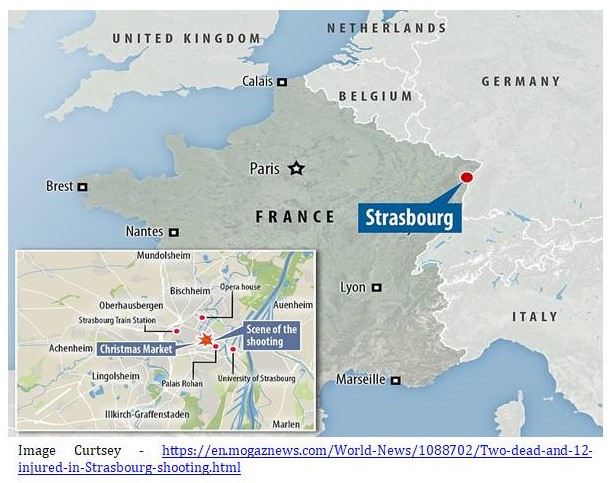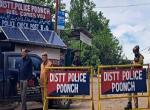The picturesque city of Strasbourg witnessed a shocking terror attack on December 11, 2018, in which a gunman opened fire around the famous Christmas market, killing at least three people and wounding 12 others. The Strasbourg Christmas markets is one of the oldest in Europe that draws millions of visitors each year. The city of more than a quarter million people is also the seat of the European Parliament.
After the attack, the Strasbourg police officers hunted the assailant, a man described as a radicalized hometown career criminal. (Peltier and Breeden 2018). The Christmas Market of Strasbourg has been tightly secured since 2015 due to multiple terrorist attacks in France and is subjected to checks at the access point is a routine.

The attack took place while France has been in the midst of severe law and order crisis caused by the ‘Yellow Vest’ agitation in Paris and other cities of France that has brought political life to a standstill and undermined the authority of French President Emmanuel Macron since November 17, 2018. Due to the continuing agitation, the Interior Minister declared (December 12, 2018), that France has raised its terrorism threat level to the highest level, reinforced border checks and increased security at markets around the country (Breeden and Rubin 2018). France has been a prime target for terrorist attacks. In 2015, Charlie Hebdo attack in which 12 people including the cartoonists were killed, In November 2015 in another simultaneous attacks 130 people have been killed and several hundred wounded. And more recently, in May this year, a naturalized French citizen of Chechen descent stabbed several citizens in a crowded area of downtown Paris near Palais Garnier, a popular destination known for Paris Opera (Breeden and Rubin 2018).
Thus moving away from France, Strasbourg, with a number of prominent establishments of the European Union located there, is seen as one of the de facto capitals of Europe. Its geographical location at the crossroads of French-German border embodies the co-existence of Europe’s two leading states which are also considered to be strong pillars of the European Union. Apart from these socio-political characters, another distinct feature of Strasbourg is its bilingual demography which represents 21st-century Christian coexistence of Catholic and Protestant religious cultures (Fitsanakis 2018). Hence no wonder, the oldest and biggest Christmas market which symbolizes this coexistence was picked up as an attractive target for the terror attack.
It may be recalled that a similar attack had taken place in December 2000 near the cathedral of Strasbourg when Al-Qaeda terrorists had killed 12 people. More recently, the Berlin Christmas market was attacked in 2016 by an assailant who ploughed a truck into the stalls and killed 12 people. In the wake of this attack, the Italian Strategic Analysis Committee met on December 12, 2018, to assess the security threat posed by radical Islamists or returning Daesh fighters from Syria and Iraq. (Adnkronos 2018). Brussels also ascertained its security scenario and fortified its winter Christmas market to avoid any similar attacks (VRT NWS 2018).
The continuing terror attacks in various cities across Europe confirm the earlier apprehension of growing Daesh footprints in the region. Even though for Daesh US was, and continues to be, the most attractive target, it has been the most difficult theatre to penetrate and execute operation in a sustained manner. In comparison, for various reasons, European cities and the UK, have been marked by Daesh leadership as prominent targets for its terror operations. One of the major reasons for Daesh preference for this theater has been the fact that terror strikes in Europe, regardless of its magnitude and form of execution, be it knife attack, bombings or car rampage, always attracts massive global publicity in comparison to similar actions in areas such as South Asia or Africa. Besides, Daesh returnees from Syria and Iraq to Europe, availability of self-radicalised individuals, ease of movement across the continent etc. also contribute significantly to execution of terror plans. Apart from these, Europe has greater connect with their families in turbulent homelands. Along with this logistic support liberal democratic societies of Europe and religious freedom provides a conducive atmosphere for these extremists to propagate radical views. ‘Lone wolf’ attacks across Europe since 2015 are the classic cases where disaffected and disenchanted youth from these European societies fall prey to such radicalization traps or self-radicalized through unrestricted internet connectivity.
The attacks of the past and ongoing several investigations in terrorism-related cases indicate that France and Belgium have been the real hot-spots and have been facing the brunt of intense terror activities of the Islamic radicals in various parts of these countries. Simultaneously, the two states are known to be the prominent centres of Europe signifying core western interests and values reflecting Europe became the ideal low-cost high pay off target for Daesh to attack. An analysis of recent attacks further suggests that through such attacks Daesh or its sympathisers not only project Daesh ideology in various parts of the world but also send signals to their sympathisers and followers that it is too early to write its obituary.
Apart from the physical and psychological impact of these terror attacks, analysts opine that such incidents also have major impact on the economy of the states and the region. These consistent terror attacks across Europe has affected negatively the economic growth of the Europe. The 28 European Union member states have lost nearly €180 billion in GDP since the Madrid attack of 2004 till 2016. In countrywide impact, the UK tops the list with €43.7 billion and France €43 billion to have suffered the highest economic loss in GDP due to terrorism. These states followed by Spain with €40.8 billion and Germany around €19.2billion (RAND Corporations 2018). While analyzing the potential rationales behind it, one realizes that the extensive coverage of terror attacks through electronic and print media along with social media has grown exponentially and has influenced the masses psychologically. Though the negative impact of terrorism is short lived one but the consistent terror strikes in some or the other parts of the Europe has its strong relative impact.
There has been a rising trend in the number of suspects arrested by the security forces since 2014 (394) suspects arrested climbing up to 687 in the year 2015, 718 in 2016 and 660 in 2017. (EU Agency for Law Enforcement Cooperation 2018). In the year 2017, nine of the European Union (EU) states faced terror strikes with the UK heading the list with 107 incidents followed by France (54), Spain (16), Italy (14) and Greece (8). Belgium and Germany reported two attacks each while one attack was reported in Finland and Sweden each. In these attacks, 68 people were killed and 844 people were injured. However, it must also be said to the credit of the security establishments that total of 205 attacks were foiled by the EUROPOL, a total of 1219 individuals were arrested in 18 EU states for terrorism-related offences. In this regard also UK led the list with the highest number (412) of suspects arrested. France was just marginally behind with 411 arrests followed by Spain (91). Most of these arrests were related to Jihadi terrorism. Despite these arrests attacks continue to happen across Europe, in 2018 nearly 23 terror attacks have been recorded. Though the number may look small but has its major psychological impact as described above.
Over this trend, the EUROPOL and INTERPOL report on migrant smuggling of May 2016 had cautioned about the fact that entry of more than 90 per cent of the migrants into EU is facilitated by the criminal networks and that the newly arrived migrants/immigrants have added complexities to the social fabric of Europe by radicalizing the existing Muslim population of these countries. The report further identified the link between terrorism and illegal migration where an opportunistic use of migrant smuggling networks and their logistics to execute terror activities across Europe was identified (EUROPOL INTERPOL 2016).
The Strasbourg attack has once again highlighted the fact that despite several years of collective efforts, the composite ability of Europe’s counter-terrorism agencies to prevent strikes on European soil still remains questionable. One must also hasten to add here that this limitation obtains in virtually all countries and regions affected by global terrorism. Hence, the historical past of terror strikes across Europe and above-mentioned statistics suggest that there is a greater need for Europe to redesign its security strategies evolving around a collective security architecture with greater emphasis on security cooperation not only in the area of actionable intelligence and joint operations but cover a much wider and deeper spectrum. The appeal made by France in the wake of Paris terror attack of November 13, 2015, provides a political basis for the European states to invoke mutual assistance clause which was done quickly in April 2016. The French appeal became the basis of cooperation for Europe which stretches across Baltics to Cyprus.
Along with institutional cooperation, there is a greater need for Europe to establish its political solidarity with greater prominence on collective security to effectively deal with the rising international landscape of terror. Hence, these attacks which have highlighted the correlation between external and internal security of Europe and underscored homeland security as an indispensable area of cooperation than its conventional belief of military cooperation.
References:
Adnkronos. 2018. "Italy's strategic analysis committee meets after Strasbourg attack." Adnkronos, 12 12. Accessed December 12, 2018. https://www.adnkronos.com/aki-en/security/2018/12/12/italy-strategic-analysis-committee-meets-after-strasbourg-attack_Qm6GvvqqdIfeJfJht4TDLP.html?refresh_ce.
Breeden, Aurelien , and Alissa J. Rubin. 2018. "Gunman Traumatizes Strasbourg, Killing at Least 3 in Possible Terror Attack." The New York Times, December 11. Accessed December 13, 2018. https://www.nytimes.com/2018/12/11/world/europe/strasbourg-shooting-france.html?module=inline.
EU Agency for Law Enforcement Cooperation. 2018. EUROPOL EUROPEAN UNION TERRORISM SITUATION AND TREND REPORT 2018. Law Enforcement Report, European Union Agency for Law Enforcement Cooperation, European Union , European Union, 9-10. Accessed December 12, 2018.
https://www.europol.europa.eu/activities-services/main-reports/european-union-terrorism-situation-and-trend-report-2018-tesat-2018.
EUROPOL INTERPOL. 2016. Europol and INTERPOL issue comprehensive review of migrant smuggling networks. Law Enforcement Analysis , EUROPOL INTERPOL Joint Venture, EUROPOL INTERPOL, EUROPOL INTERPOL. Accessed December 12, 2018. https://www.europol.europa.eu/newsroom/news/europol-and-interpol-issue-comprehensive-review-of-migrant-smuggling-networks.
Fitsanakis, Joseph. 2018. "Analysis: Strasbourg attack raises serious security concerns in Europe." intelnews.org, December 13. Accessed December 13, 2018. https://intelnews.org/2018/12/13/01-2456/.
France 24. 2019. "France's 'yellow vest' protesters block access to fuel depots." France 24, November 19. Accessed 11 2018, December . https://www.france24.com/en/20181119-france-yellow-vest-protesters-block-access-fuel-depots-taxes-total.
Peltier, Elian , and Aurelien Breeden. 2018. "France Declares Strasbourg Shooting an Act of Terrorism." The New York Times, December 12. Accessed December 12, 2018. https://www.nytimes.com/2018/12/12/world/europe/france-strasbourg-shooting.html.
RAND Corporations. 2018. "The cost of terrorism in Europe." https://www.rand.org. June 6. Accessed December 29, 2018. https://www.rand.org/randeurope/research/projects/the-cost-of-terrorism-in-europe.html.
VRT NWS. 2018. "Extra police to patrol Brussels Christmas market after Strasbourg attack ." VRT NWS, December 12. Accessed Decemer 13, 2018. https://www.vrt.be/vrtnws/en/2018/12/12/extra-police-to-patrol-brussels-christmas-market-after-strasbour/.
Image Source: https://www.timesofisrael.com/french-police-try-to-catch-attack-suspect-dead-or-alive/
(The paper is the author’s individual scholastic articulation. The author certifies that the article/paper is original in content, unpublished and it has not been submitted for publication/web upload elsewhere, and that the facts and figures quoted are duly referenced, as needed, and are believed to be correct). (The paper does not necessarily represent the organisational stance... More >>











Post new comment